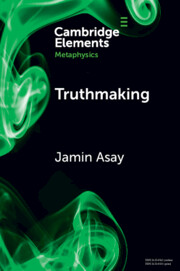Element contents
Truthmaking
Published online by Cambridge University Press: 20 January 2023
Summary
Keywords
- Type
- Element
- Information
- Series: Elements in MetaphysicsOnline ISBN: 9781009109987Publisher: Cambridge University PressPrint publication: 02 February 2023
References
- 2
- Cited by



